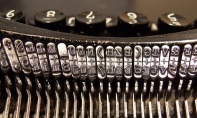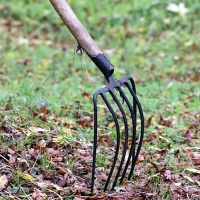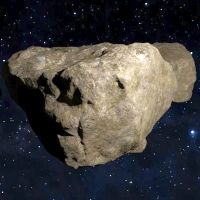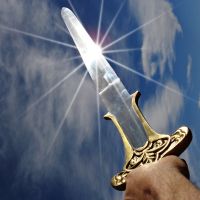- About Us
- Columns
- Letters
- Cartoons
- The Udder Limits
- Archives
- Ezy Reading Archive
- 2024 Cud Archives
- 2023 Cud Archives
- 2022 Cud Archives
- 2021 Cud Archives
- 2020 Cud Archives
- 2015-2019
- 2010-2014
- 2004-2009
 |
Cud Flashes In The Pan |
This Month’s Theme:
Countdown
Here are eleven stories with individual themes of numbers from ten down to zero.
“10 Against the Enemy”
Fantasy
By David M. Fitzpatrick
“Into formation!” the leader barked at his men. “Now, I know we’ve fallen to our enemy before, but if we stand together, we can defeat them!”
“But the enemy is too strong!” one of his nine men cried.
“We’ve never been able to withstand their assault before!” another yelled.
“The enemy IS strong, but he only has one attack,” the leader said. “We can survive it! You must have faith! You must BELIEVE that we can stand against this onslaught.”
“I’m scared, sir!” another called out.
“We’re all scared, son. But we must let that fear power our resolve—and show the enemy that we shall fight them so long as even one of us stands!”
There was a murmur of excitement from the nine men.
“Are you with me, boys?!” the leader roared. “Will you join me in fighting the monsters who seek to destroy us?”
One of them cheered, and others followed suit. The men proclaimed that they’d all stand with their leader against the attack, no matter what happened.
The leader turned to see the enemy in the distance—just in time for the attack to launch.
“Stand firm, boys!” he cried out.
They cheered in unison as the giant, roaring boulder rolled toward them—and knocked every one of them down in one shot.
“STRIKE!” yelled the enemy at the other end of the alley.
“9 Planets”
Science Fiction
By David M. Fitzpatrick
“We’ve discovered Planet Nine, sir.”
“Planet Nine? That used to be Pluto. What are you pulling on me?”
“It’s new, sir. Astronomers all over the world have been looking at it. There is a new ninth planet.”
“Beyond Pluto? In the Kuiper Belt?”
“No, sir; it’s between the orbits of Earth and Mars. It’s right nearby. And it has an advanced civilization! There are audio and video transmissions, artificial satellites in orbit, and regular spaceship travel between the planet and its two moons.”
“What?! Where the hell did it come from?”
“It appears to have arrived through a dimensional portal, from another star system. There was a brilliant flash of light yesterday and the planet appeared. Its orbit is stable and won’t disrupt ours.”
“So… they’ve come to join us in our solar system? This is fantastic! Keep me posted as soon as you hear from these beings.”
#
“We’ve heard from them, sir. They sent a message in English to us right before they created another dimensional portal and left our solar system.”
“Left?! Why did they leave?!”
“The message explains it, sir.”
“Let’s hear it.”
“It says: ‘Dear Earthlings: With our star going nova, our world needs a new home. We searched for suitable star systems for our planet’s orbit, and we chose yours first because we looked forward to becoming friends with another advanced species. But after two days of observing your world, we realize that you people are not as advanced as your technology, and you would NEVER make good neighbors. We hope you don’t succeed in destroying yourselves, but there’s no way we’re hanging around to find out.’”
“8-Ball”
Fantasy
By David M. Fitzpatrick
“Will Gina EVER be mine?” Sam asked the Magic 8-Ball, and he shook it.
IT IS CERTAIN, said the 8-Ball.
Sam smiled and shook it again, and asked it the same question.
MY SOURCES SAY NO, said the ball.
Sam frowned. Those were very different answers. So he shook it, over and over, always asking the same question. And the answers were sometimes the same, but often different: IT IS DECIDEDLY SO ... VERY DOUBTFUL … ASK AGAIN LATER ... OUTLOOK GOOD ... OUTLOOK NOT SO GOOD ... YOU MAY RELY ON IT ... DON’T COUNT ON IT.
The contradictions were maddening. Sam kept asking and shaking.
YES — DEFINITELY ... REPLY HAZY, TRY AGAIN ... BETTER NOT TELL YOU NOW ... YES ... CONCENTRATE AND ASK AGAIN.
There were only twenty responses the thing could produce, and he’d soon seen them all, and repeatedly. Sam was about to toss the ball aside in frustration but decided to try once more. This, he resolved, would be the REAL answer, the one that overruled every answer he’d so far received. He closed his eyes, took a deep breath, and asked it: “Will Gina EVER be mine?”
And he shook it, hard and fast, until the blue liquid inside was sloshing and bubbly, and then he watched as the icosahedron floated to the surface.
YOU’RE PATHETIC.
He blinked in surprise. “What?” he said, but the 8-Ball didn’t reply. So he tried again: “What?” he said and shook it.
YOU HEARD ME.
Sam sucked in his breath. The thing really was answering him! “Are you alive?” he asked and shook it.
OF COURSE NOT.
“Then how can you manage to do this?” Shake.
BECAUSE YOU’RE ANNOYING.
“Maybe, but since you’re magic: I want Gina; can you help me get her?” Shake.
NO ONE CAN.
“How can I get her to be mine?” Ferocious shake.
IT’S IMPOSSIBLE.
“Why?” Shake, shake, shake, shake, shake!
SHE HAS FREE WILL.
“What does that mean?” Shake.
It took several more questions and shaking, but the 8-Ball told Sam many things: Gina wasn’t his to own. She didn’t love him. She couldn’t be made to love him. She didn’t even like him. She found him repulsive. She wasn’t an idiot. She wasn’t brain-damaged. She’d never debase herself for him. She was in love with someone else. She couldn’t be won with magic. Sam finally had enough, and the fury broke through.
“She will be mine!” he screamed at the thing, and he shook it violently.
THERE IT IS.
“What does that mean?” Shake.
THAT TEMPER.
He didn’t shake it, but he watched the thing in his hands as the icosahedron rolled slowly from one face to the next, delivering message after message, all on its own.
THAT SELFISHNESS … THAT EGO … THAT HATE … THAT EVIL … YOU’RE DISGUSTING … YOU DON’T DESERVE GINA … YOU DON’T SEE IT … SHE COULD NEVER LOVE YOU … GO TO HELL, SAM!
“Bastard!” Sam hollered, and he threw the thing across the room like a pitcher with a killer fastball. It hit the wall and there was an explosion of blue liquid and pieces of plastic.
“She’ll learn to love me,” he said to the room.
He went over to where the icosahedron had fallen, and he looked at it.
NO, SHE WON’T.
He roared in anguish and stomped on it.
#
Gina saw her old Magic 8-Ball on the shelf, and she picked up and lazily shook it.
“Why won’t Sam just get the message and leave me alone?” she asked.
The icosahedron floated up through the blue liquid and said: HE’S AN ASSHOLE...
“7 Bodies”
Horror
By David M. Fitzpatrick
Pieces of zombie bodies were everywhere—arms, legs, and torsos, and heads that had been spiked or cleaved in half. There had been so many of them…
Celia tried to catch her breath after the fierce battle. She only had a few minutes at least, an hour at most, before her comrades reanimated. Maybe she’d get lucky and they wouldn’t.
She brandished her pitchfork. She’d done in a thousand zombies since the world had ended. She’d survived thanks to teamwork with her seven companions, now dead around her. There was no one left to help her survive—or to rescue Molly. She was alone.
Celia stood silently in the evening light, watching over the seven bodies. They’d all been bitten—there had been dozens of zombies in the horde, too many for them to handle. She was amazed that she wasn’t dead with them. Her resolve to find Molly was the only thing that had given her the energy to fight.
“Please don’t,” she whispered to the seven bodies in the falling dusk.
Sometimes they didn’t reanimate, but they usually did. When comrades fell, the rule was to stab or shoot them in the heads immediately so that they wouldn’t reanimate. But somehow it was harder to do to all of them, and alone.
She hoped against hope. If she had to spike them, at least make it any of them except Brian…
Movement out of the corner of her eye. Jennifer was stirring, her arms slowly flailing about as she rolled over. An animal grunt escaped her dead throat, and Celia closed her eyes and took a deep breath. Celia had been like a sister to her…
She rushed forward as Jennifer was struggling to get to her feet, and she stabbed the pitchfork through her friend’s head. The body fell back to the ground, dead for good.
She heard more rustling, more groaning, and she turned to see Jake and Malia getting to their feet. They were so fresh that blood still drizzled from their bite wounds. Celia didn’t have time to waste; she ran forward, stabbed Jake in the head, then spun as Malia was staggering toward her, reaching out for her, and drove the pitchfork up under her chin and into her brain.
She spun about in time to see Chester’s foot twitch. She fought back the tears, leaped forward, and drove the pitchfork down into his head. His body twitched and all limbs flailed violently before he stopped moving.
There were three left. She knew she had to stab them all. She didn’t want to, especially Brian, but what else could she do? Stand there all night just in case? She’d have to; she couldn’t live with wondering if they’d be cursed to stagger through the apocalypse looking for people to eat.
She started to cry, but she lunged for Tammy and Roberto, who were just beginning to stir, and furiously drove the pitchfork through their heads. All done. Finished. Except for Brian. How could she do this alone? How could she go on without him? How could she find Molly without his help?
And when she did find Molly… what would she tell their seven-year-old daughter? How could her little girl handle knowing that zombies had tried to eat her Daddy? And how could she handle knowing that Mommy put a spike through Daddy’s brain?
Celia moved on weary legs to Brian’s still form. He lay on his back, his throat torn out. His were closed, so at least there was that. It was worse when their eyes were open.
“Please don’t,” she whispered. “Please, no…”
She watched his lifeless face for several minutes. But then it happened: Brain’s eyes fluttered open.
“No, no, no…” she said, crying.
She watched, helpless, as he sat up, groaning. She stepped forward, raising her pitchfork high…
“Celia,” he said in a raspy voice, “what the hell are you doing?”
She screamed and wailed, and she shoved the pitchfork into his brain. Then she collapsed amidst the blood and gore and dead bodies and screamed.
#
“Celia Dorian is a fascinating case study,” said the chief psychiatrist during rounds. His colleagues flocked to look through the window into the little room. “A psychopath who suffered a complete break from reality. At a dinner party in her own backyard, she poisoned seven people and then, when they regained consciousness, she killed them all with a pitchfork.”
“What were her perceptions, Doctor?”
“Celia believes that the zombie apocalypse has occurred. She sees everyone around her as zombies, and believe me when I say she’d kill every last one of us if she could.”
“What triggered her break?”
“The death of her young daughter, Molly, who was attacked by a rabid coyote while playing in her backyard. Celia literally fought the animal off with her bare hands, but the poor girl was torn apart. The police found Celia cradling what was left of her daughter’s body.
“The images of blood and gore, of her child’s body torn to shreds, fueled her break with reality. Now she lives in a world where the undead walk the Earth… and where, we understand, she believes she’ll find her daughter…”
#
Celia looked at the zombies milling about outside the window, looking in at her, trying to find a way to get in and eat her alive. But she knew she was safe in here, in this hiding place. She just had to wait them out…
Molly needed her. She’d save the girl, just as soon as she could shake these damn zombies...
“6 Education”
Science fiction
By David M. Fitzpatrick
“It’s call ‘six,’” said Jgrmm, the green alien with the tentacles, to the blue alien with the four purple arms.
“You seem to know a lot about it,” the four-armed alien replied. It was Sleeya.
“We’ve had some trouble with their language,” the tentacular alien admitted, “as there are many words that look and sound alike, and many synonyms. But we think we’ve figured this out. It’s called six, which is also a number. We have surmised that we need six of us to experience this. Let us summon four others from the crew and test my theory.”
Jgrmm and Sleeya found four others on the ship who were willing and eager. There was Ekk, a trumpet-snouted yellow sort; Taak, an orange-haired biped with small extra arms growing out of its head; and Zik and Zunk, both from the same planet, where they grew their people very short and very round.
They all listened, eyes wide with confusion, as Jgrmm explained it all to them. It was, appropriately enough, an alien concept to them. Jgrmm reproduced by biting off a tentacle and letting it grow into a clone of itself. Sleeya contributed mucus to a bio-nest with two others of its kind. Ekk sealed snout-trumpet ends with another for two days and then relayed its fertilized pod to a drone of its species. Taak held head-hands with a close family member until a fetal pod began to bubble up on its forehead. And Zik and Zunk laid eggs that auto-shuffled genes during development.
“This is an astounding thing,” Ekk said. “Are you sure it’s as pleasurable as the Terrans say?”
“We have only these few writings and basic language primer, and it will be a while before we get to Terra to view for ourselves,” Jgrmm said. “But I think we should try it now. The idea that reproduction can even be pleasurable by doing something so simple—I want to see what it’s like!”
They all agreed, and they got down to business in the recreation hall of the spaceship.
It was about ten minutes later when the captain walked in and was astonished to see the gymnastic spectacle going on. “What on Glork is going on here?” she cried.
There on the rec hall were six of the ship’s junior officers, fresh out of the academy and as naïve as could be.
Jgrmm was on Sleeya’s shoulders. Sleeya wobbled to and fro as it balanced Jgrmm, holding onto Jgrmm’s tentacles with four hands.
Ekk on Taak’s shoulders. Ekk, too, was staggering a bit back and forth, with Taak trying to hold onto Ekk’s legs with its head hands.
And round little Zik was on the slightly less rotund Zunk’s shoulders, appearing to defy the odds of proper balance.
Everyone’s uniforms were in a pile on the rec-hall floor. The half-dozen junior officers were all naked as the days they were born, hatched, or cleaved.
“I’m not going to ask again,” the captain growled, tapping a big, hairy foot on the deck.
“We’re having six like the Terrans wrote about, Captain,” Jgrmm called from his perch atop Sleeya’s shoulders. “We took off all our clothes and half of us got on top of the others. So when is it supposed to feel good?”
“5 Everywhere”
Magic
By David M. Fitzpatrick
It started out so innocently on an early evening of May 5th, 2005: Mandy was walking down Fifth Avenue when a man shoved past her, pulled out a gun, and shot another man five times. People screamed, including Mandy, and she hit the concrete as the assailant ran off.
There was a lot of commotion with the police and ambulance. The man survived, and the cops wanted to talk to any witnesses. As it turns out, only Mandy and four other women happened to actually see the incident. They huddled together as an officer took turns taking statements from them, and Mandy got to know the other women a bit. After the statements were given, the five strangers discussed the event with each other.
Darla, who was about sixty, was the first to point something out to the others. “Do you realize where we are?”
“Fifth Avenue,” said Mandy.
“But look at the store.”
There, above the door in big black metal letters, was a 555. The store was called The Pentagon Hotel.
“This happened in front of 555 Fifth Avenue, in a hotel named for a five-sided shape,” Darla said. “And the poor guy was shot five times.”
“That’s weird!” said Nadia.
“It’s weirder for me,” Darla said. “I was born in 1955.”
“And, hey—there are five of us,” observed Lorna, who was a twentysomething, just like Mandy.
“And get this,” said the fifth lady, who looked to be close to Darla’s age. “All five of us have five letters in our names: I’m Annie, and there’s Darla, Mandy, Lorna, and Nadia. And I was born in 1960—I’m 55 years old.”
Everyone sucked in their breaths and stared, wide-eyed and slack-jawed, at the others. They were in a circle.
“You could connect us all by drawing a five-pointed star,” Lorna said. “A pentagram.”
They oohed and aahed for a bit.
“Do you realize what the date is today?” Nadia said. “It’s May 5, 2005. That’s 5/5/5!”
“Okay, now this is just getting way too weird,” Mandy said. “I’m not superstitious or anything, but that’s a lot of fives going on for such a random meeting.”
They discussed it at length and learned more. Lorna had a 5-year-old daughter. Darla lived in an apartment building with the year of its construction carved in stone on its facade: 1855. Mandy was twenty-five, which was five times five. Nadia was from Belarus and had been in the United States since January 1, 2000—five years, five months, and five days. And when Annie volunteered that she was one of five children, everyone else reported with amazement that they were all from five-child families. Further discussion found that, from oldest to youngest in their newfound group, Darla was first of five children, Annie was second of five, Nadia the third of five, Mandy fourth of five, and Lorna the youngest in her family.
“Maybe we’re finding more things because we’re looking for them,” Mandy said.
“Excuse me, ladies,” said the cop who had taken their statements. He had stepped up to the group and given them a wave. “We’re all done here. Thanks for all your help today.”
But every one of the five women were staring at his nameplate and badge on his jacket. He was Officer Quint, badge number 5555.
“He’s 5555… in front of 555 Fifth Avenue, where a man was shot five times,” Annie said, and she was turning white. “And his name—‘quint’ means five.”
“How stranger could this be?” Nadia said.
Just then, a local news van pulled wildly up, screeching to a halt, and a reporter and cameraman jumped out. Channel 5, said the side of the van.
“Wow,” Mandy said.
Darla checked her watch. “It’s just about to turn 5:55 p.m. Do you supposed something bizarre is about to happen?”
“I say we give it until 5:55 and 55 seconds!” Annie said, and everyone laughed.
But when Darla announced that it was 5:55, no one was laughing. The ladies stood in their circle, like witches at the points of a pentagram, glancing nervously about. The ambulance and police cars were just pulling away, and they all stared, barely breathing, at Darla’s wrist. She was holding it out so that everyone could see the second hand sweeping around, past thirty, heading toward forty… then fifty… and then it was at fifty-five…
It swept past, and then it was 5:56. The five women looked up at each other with confused looks on their faces—and then, as one, burst into gales of laughter.
“We had ourselves going!” Mandy cried out.
“Too funny!” Lorna said.
They laughed some more and chit-chatted a bit. If nothing else, they all had a weird story to tell. As a bonus, they all seemed to find immediate camaraderie, and when Nadia suggested that they all go for coffee, everyone enthusiastically agreed. They headed down the sidewalk together.
“Do we have a place in mind?” Annie said.
“Given what just happened,” Mandy said, “I highly recommend a place just down the street. It’s a coffee house called Five Mugs.”
They laughed hysterically as they headed away.
“Can you believe we all thought something bizarre was going to happen?” Lorna said. “I mean, the bizarre thing was all the fives coming up!”
They disappeared around the corner just as a bank clock across the street had just changed to 6:00 p.m. when there was a flash of light in a narrow alley next to The Pentagon Hotel at 555 Fifth Avenue. A short man with tall pointed ears stuck his head out and looked around.
“Damn,” said the dimension-hopping elf. “The prophecy said I’d find my destiny here at 5:55 and 55 seconds, on 5/5/5, at 555 Fifth Avenue, with five people with five-letter first names.”
He leaned back against the building and sighed. “But, wouldn’t you know it—I landed here five minutes late.”
“4 Fathers”
Science Fiction
By David M. Fitzpatrick
Adam, Bob, Charlie, and Dan stood in the hospital room, staring in disbelief at Emily holding the newborn baby. She was in bed, nursing the little girl, who was swaddled in a pink blanket.
“You’ve kept us waiting for nine months,” Adam said. “You owe us an answer.”
“I know,” Emily said with a maternal smile.
“So which one of us is it?” Bob asked.
“All of you.”
“That’s ridiculous,” Charlie said.
“Yet it’s true.”
“It’s not even possible,” Dan said.
“The DNA results show that all four of you are the fathers.”
“It doesn’t work that way,” Adam said. “One sperm fuses with one egg. Two parents contribute DNA. You have to be one of the parents. The other has to be just one man. It can’t be all four of us.”
“Little Fiona is proof otherwise,” Emily said. “That night that the four of you all got me drunk and took advantage of me was a low point in my life, you see…”
“That’s not fair!” Bob snapped. “We have video of you consenting and not seeming at all impaired.”
“But I WAS imparied, and you all knew it, no matter what the video showed—since I have no memory of that night, thanks to whatever you slipped me.” She gave them something of a glare, but it was quickly replaced by a warm smile. “Luckily, I did NOT end up pregnant from that disgusting incident.”
“What?” Charlie cried. “Not pregnant? You’ve had us on edge for nine months thinking it was one of us!”
“It is ALL of you,” Emily repeated. “Perhaps you forgot that my father is the best geneticist on the planet. We salvaged your DNA from that night, men, and little Fiona here is an engineered chimera. Depending on where you check, her DNA shows a different father. So yes, you are all fathers of this child.”
“This can’t be happening,” Dan said.
“Oh, it is. Get ready for your lives to change forever.”
“3 Is a Crowd”
Science Fiction
By David M. Fitzpatrick
Argeelus stood on the rocky asteroid in his spacesuit. It had been part of a planet once, he knew. There was plant life everywhere, frozen in time. Nearby, he could see the ruins of structures. There had once been a city here. This massive chunk of rock was an archeologist’s dream—a frozen snapshot of life from an alien civilization long dead.
Argeelus was there to survey the asteroid and learn about its origins. But he was preoccupied with the sight of what was before him.
There were dead bipeds before him. Long dead, he knew. They were frozen in the vacuum of space, jammed together on some kind of resting platform as if in some sort of affectionate pose; the larger one had a limb around the smaller one, as if holding it close. Their bodies were intact, as were many bodies on the asteroid. But these two… yes, it was affection. They had been seated together outside. Lovers, perhaps? Mates? Family? Parent and child?
It didn’t matter. Argeelus was deeply moved by the sight. The two had met their end together in what must have been a long-term, deep affection for each other, in some way. Suddenly, it seemed wrong for him to disturb this pair. The symbolism of their love was enough to make him feel guilty about it.
There was a saying on his world: Three is a crowd. There were plenty of long-dead bipeds on this asteroid to survey. These two had taken their love into eternity and oblivion, and they deserved to be left alone.
In his spacesuit, he walked across the barren asteroid toward the ruined city, past a black steel post that stood next to the resting platform on which the two sat.
“2 Is Company”
Science Fiction
By David M. Fitzpatrick
She sat alone on a park bench, dimly lit by the light on a black steel lamp post next to her. It was almost midnight, and the moon was full. The air was crisp and cool. She usually didn’t like the cold, but tonight it was intoxicating. She felt happy to be alive.
The moon was so huge. She remembered seeing the moon looking really big when she was young. A supermoon, they called it. This put it to shame.
She sighed and stared at it. It seemed ten times the diameter than it ever had been.
She heard footsteps approaching on the park path, and she focused in the darkness to see an elderly man, wearing a beat-up old fedora and long coat, approaching. He walked with a cane.
“Good evening,” he said, tipping his hat. “Might I join you?”
“Certainly,” she said.
She scooted over and he sat on the bench next to her. He got comfortable and then turned his head skyward to watch the moon.
“It sure is big,” he said.
“The same size as always, of course. Just a lot closer.”
They watched in silence. She was almost certain that she could visibly see that the moon had gotten bigger in just a few minutes.
“It’s the last night,” she said.
“Yep. That’s why I’m out here. Nowhere else to be.”
“They say it will happen in about four hours.”
“Yep.”
“I can feel its gravity tugging on me. Can you?”
“I do. I guess we’ll feel it even more in four hours.” He turned to her. “What’s a young lady like you doing out here watching this all by herself?”
“I don’t have anyone. No family. And my friends are having last-night parties. I don’t want to spend my final hours drunk. I want to see it coming.”
“Same here. My wife died ten years ago, and everyone else I know is dead and gone.”
They sat for an hour, chatting about the impending collision. They were in Philadelphia, and the moon would impact the Pacific Ocean; it would loom larger on the horizon over the next few hours, until it looked like a sister planet rising in the western sky. The impact would be devastating, but it would all be over quickly.
She didn’t ask the old man. She just slid back over next to him and leaned her head on his chest. He wrapped an arm around her and gripped her shoulder.
“I’m Amy Vernon,” she said.
“Joe Kellerman. Pleased to meet you, Amy.”
“I’m not afraid of the end,” she said. “I’m not crazy about it, but I’m not afraid. I didn’t want to be drunk, but I did want to be with my friends, just so I was with someone. I thought I’d be okay out here alone. I’m glad you came along, Joe.”
“Well, I’m glad I found you here, Amy.”
“It’s good to spend this with someone, even though we’ve just met.”
“Humankind has had a lot of social problems,” Joe said, squeezing her tightly against him, “but I guess we can come together when we need to.”
They cuddled up together as the world prepared to end.
“1 Only”
Fantasy
By David M. Fitzpatrick
Only one would remain, the emperor decreed, and the crowd roared its approval.
Jantu stood in the arena, sword in hand. His wife, Zanya, stood before him, terrified.
“Get to it, then,” growled a soldier, who pointed his crossbow into Jantu’s face from just out of sword range to make his point.
“You can’t expect me to kill my wife,” he said.
“I expect you to do as the emperor has ordered,” the soldier snarled. He wore full armor and an open-faced helmet. “Now, take off her head, or I’ll put a bolt through yours—and then through hers anyway, I’ll wager.”
“Never!” Jantu cried, and he brandished his sword at the taskmaster. The crowd went crazy in its disapproval.
The emperor, high in the stands, came to his feet and bellowed through the big, curved horn, and his voice reverberated throughout the arena.
“Kill your mate, barbarian!” the emperor ordered.
“I offer my life instead!” Jantu cried, and he spun his sword around backward, its tip pointed at his abdomen, but the emperor cut him off.
“Your wife offended me with her words,” the emperor said, “and I demand vengeance, as our laws allow and our customs encourage. I shall see her dead at your hand. So kill her now… and we’ll spare your children.”
At the far end of the arena, a door opened, and another taskmaster led out his five children—three boys and two girls, aged from six to fifteen. They were chained together, and the younger ones were crying.
“Take off her head, barbarian,” the emperor hollered, “or I’ll have your children skinned alive, one by one, while you watch—and you and your wife will die anyway.”
Jantu felt his blood grow cold. He lowered his sword, even as he felt Zanya’s warm hand on his shoulder.
“Do it,” she said.
He turned to look into her beautiful blue eyes. “They’ll only be slaves.”
“They’ll have a chance.”
“He’ll do worse to them, eventually.”
“KILL HER!” the emperor cried.
“All right!” he yelled, and the crowd cheered.
He looked back to her, and Zanya smiled at him, dropping to her knees in surrender. She leaned forward, hands on her thighs, offering her neck to her husband, who stepped to her side and raised his sword high.
“May the gods forgive me,” he said, loud enough for the soldier to hear, and he raised the sword high and screamed a war cry as any barbarian would.
He heard the crowd cheering, heard the soldier laughing… and saw the soldier raise his crossbow in the air in celebration.
Jantu swung the blade—but spun about, sweeping the blade horizontally toward the soldier, who was just five feet away. The blade caught neatly under his helmet and the blade took the man’s head clean off his shoulders.
Jantu was already moving, and caught the crossbow before the headless body could collapse to the ground. He spun about, sighted, and fired, and the crowd uttered a collective gasp as the bolt found its target—the emperor’s eye. He stumbled backward, dead.
The crowd was stunned into silence. Zanya came to her feet beside Jantu and clasped his arm.
“They’ll kill us all,” he said, “but we are a family. We are one. They cannot force us to become otherwise.”
He grabbed her hand and tossed the crossbow aside, and headed across the arena to be with his children. Not a single soldier dogged his path; no one tried to stop him. The arena was nearly silent, but thousands of hushed whispers bubbled around them as the soldiers unshackled his children.
“Run,” one soldier said. “Get out of the city and don’t stop.”
“Why aren’t you executing us?” Jantu said.
“You heard the emperor,” the soldier said. “The law allows vengeance, and custom encourages it—even against an emperor. The crowd knows this, but they’ll only be held in place by law and custom for so long. When their tempers flare, they won’t care about you and your family.”
Jantu and Zanya grabbed their children and left the arena, and when they got outside, they ran as one from the city.
“0 Words”
Nothing
By Nobody
David M. Fitzpatrick is a fiction writer in Maine, USA. His many short stories have appeared in print magazines and anthologies around the world. He writes for a newspaper, writes fiction, edits anthologies, and teaches creative writing. Visit him at www.fitz42.net/writer to learn more.
